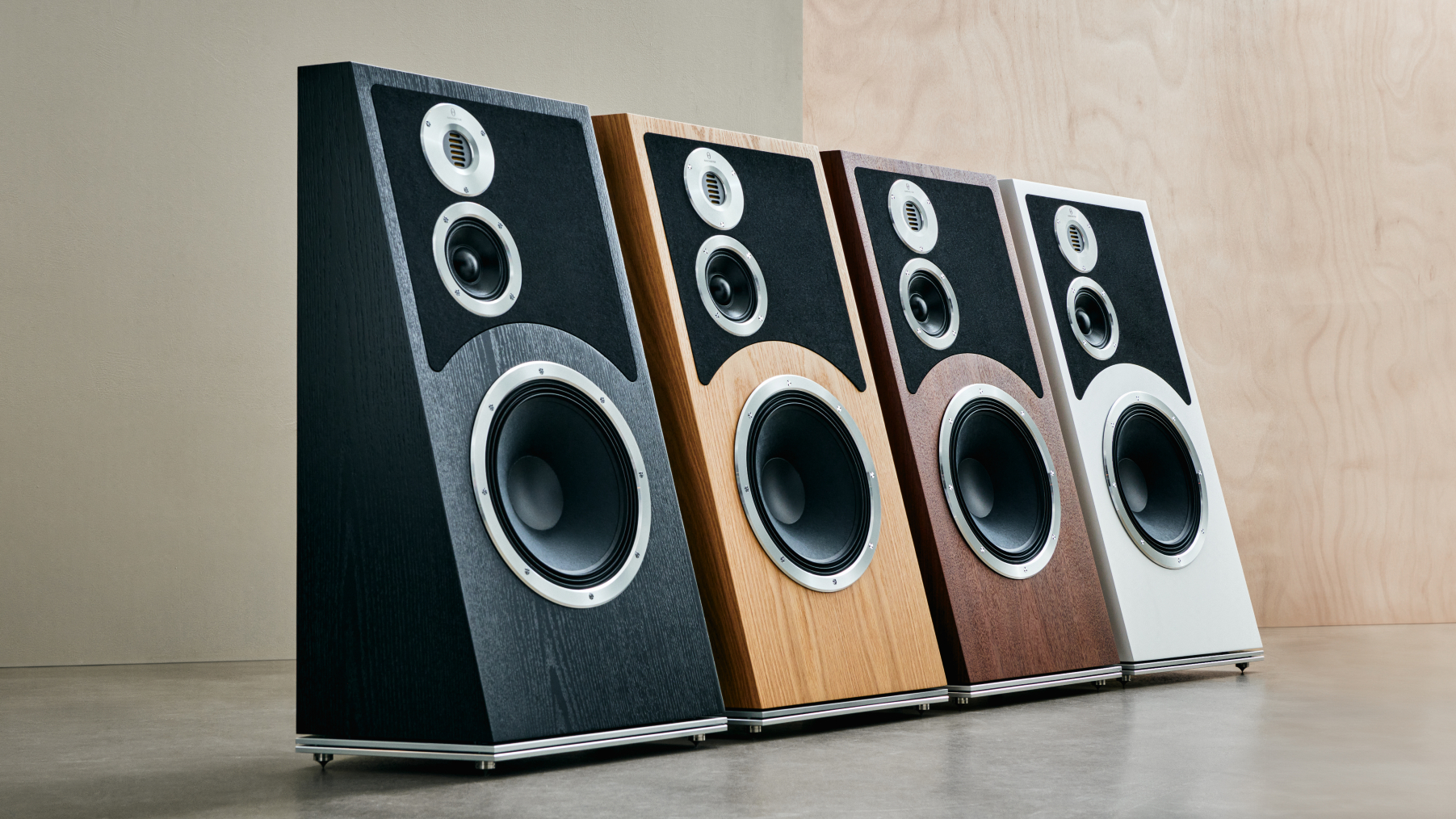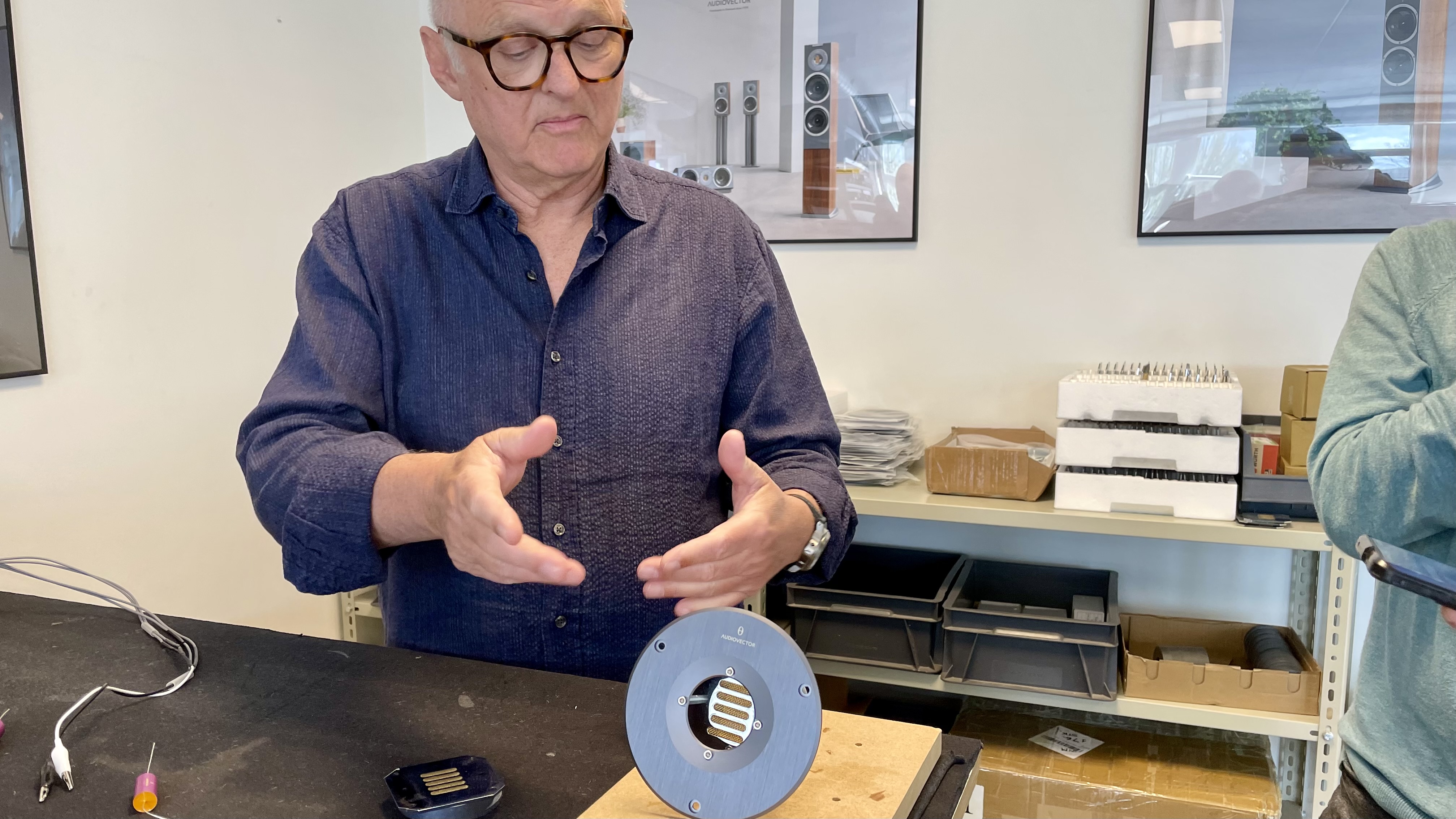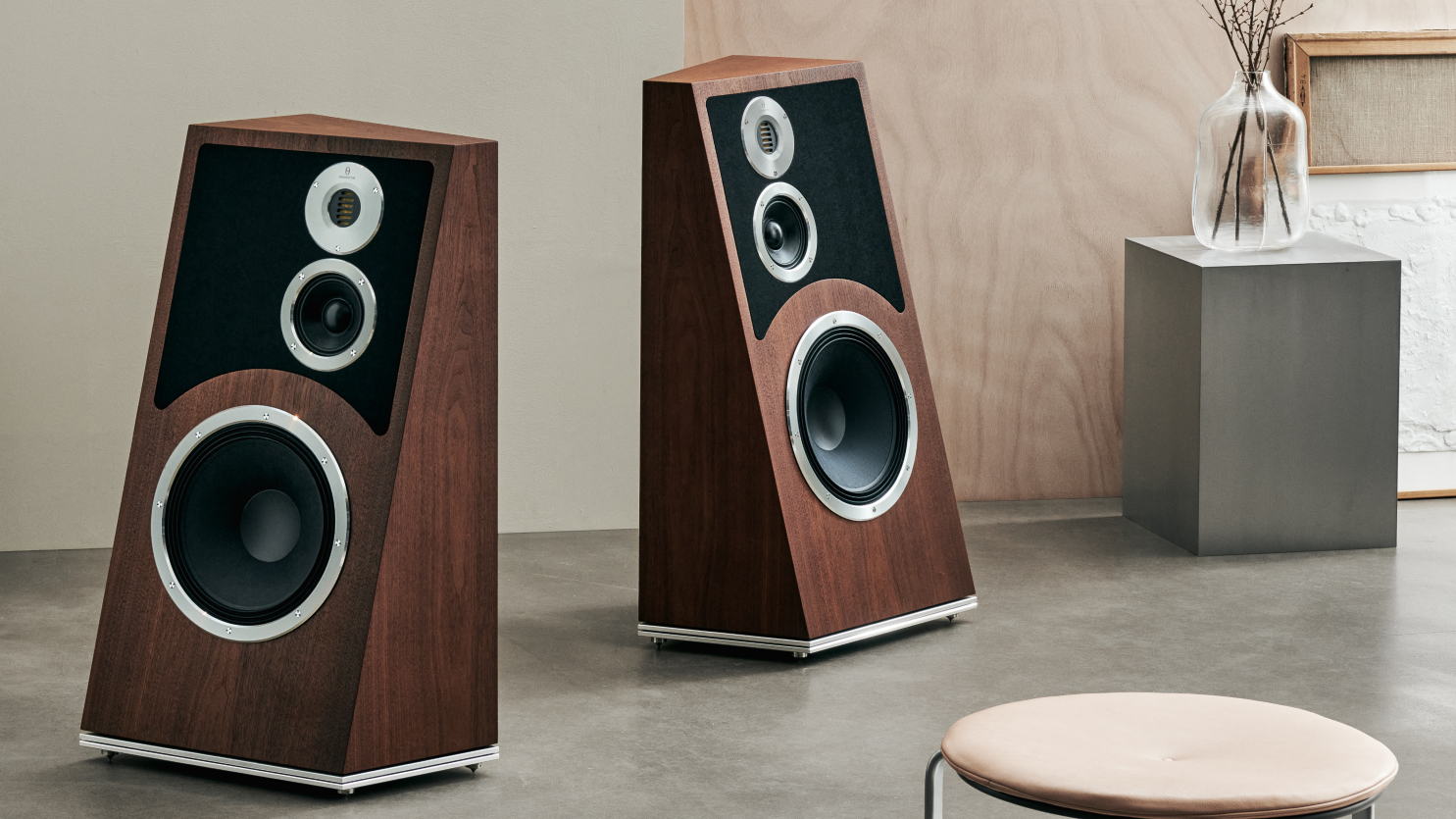[ad_1]
Being brought to tears by something other than music at a high-end speaker demo is a first. But then, Audiovector is not your average hi-fi outfit. So here I am, with no option but to dig the esteemed member of the audio press standing next to me in the ribs, dab at my mascara and mutter “I’m not crying, you’re crying!”.
What happened? Oh, we’re in Copenhagen at Audiovector‘s small but beautifully Hygge HQ, where founder Ole Kifoth just unveiled his latest masterwork, the Trapeze Reimagined (or ‘Trapeze Ri’ for short), despite being in what he calls “semi-retirement but, you know… still designing”.
We didn’t know this before we arrived, but we’re here to experience a reimagined update on the gloriously lopsided Trapeze stereo speaker Klifoth designed and launched 45 years ago, in 1979 – his first speaker. Only, that’s not the point right now. The point is that his closing remark before setting us loose to listen to it concerns neither the new purpose-designed open-back Audiovector SEC Air Motion Transformer (AMT) tweeter, nor the five-inch midrange unit, or even the 12-inch mid/bass driver within this beautifully offset arrangement. No, instead he looks over and speaks directly to his son, who stands beside him now as the CEO of the business.
“I’m fortunate enough to see the work of my life being taken over, and handled extremely well I think, so…” he slaps the younger man on the back, his voice faltering as he says simply, “Thanks, Mads”.
Not a dry eye, I tell you.

Having pulled myself together long enough to weave in some specs on the new Trapeze Reimagined (did you see, above?) I now need to make it clear that Ole Klifoth and his son – who still live within 3km of each other – are fanatical music lovers.
Over the course of our two-day listening session (interspersed with some wine-tasting and a trip to a local restaurant where one of Mads’ friends works – hey, we gotta eat) we listen to everything from Ghost Rider to Rimsky-Korsakov; from Stone Temple Pilots to Joni Mitchell; from Prince to Alan Thwaites. We also listen to the Trapeze Reimagined hooked up to a mid-range Moon amplification system and a Gryphon combination, but the family occasionally use a Burmester integrated option “for cosy evenings here” (all of these companies are friends of the family) – and always using Audiovector cables.
When one of our party mentions a particular moment of unusual clarity, Klifoth enthuses, “yes – although actually, the quality is already there, on the table. All you have to do is release it”.
“Thank you though,” he adds, “I really tried to stay true to Dr. Oscar Heil with this AMT tweeter – for me, hard dome tweeters sound like inverted bin lids compared to it”.
‘It’s crazy, I still have the old crossover circuit in my head 45 years on – although that didn’t work for this’

I ask Ole Klifoth what it was like reworking something he completed back in 1979 (which was a good year; I also made my physical debut in ’79) and how it felt becoming something of a Time Lord.
“Mads persuaded me to do it! In the beginning, I didn’t want to, actually – I thought it was not related to the other products. But he was right – he kept saying, ‘we need this icon. Dad, you have this icon that you’re not using! Do it!'”
So was the process enjoyable? “Yes, and in a way it was like going back in time, because – and this is crazy – I still have the old crossover circuit in my head, 45 years on… although that one didn’t work for this product!”
He laughs again: “I’ve spent my life playing with speakers and having fun with it so, really, they are my babies”.
I ask if he has one piece of technology or one aspect of the design he’s most proud of? “No, I have 20!” he laughs – and you can’t argue; he’s done well.
“No, that requires an explanation!” he cuts in, keen not to come off aloof: “Our company is built on building blocks, all of them building towards the same goal: to build something which is fast, precise, natural, easy to listen to and musical. It doesn’t matter whether I talk to you about grounding, or driver design, or decoupling of drivers, or any of those! Everything I do is centred around the idea of it sounding like a good concert hall or a good jazz club.”
So does the Audiovector Trapeze Ri sound like a good jazz club? During my time listening to them, it’s a yes from me – and this updated model is aided by a unique extra you won’t find in even the best stereo speakers.
Of course, there’s its particular shape, which allows the speakers’ rear cabinet to match the angles of the corners of most rooms (albeit ideally 70cm away from those) yet angle its drivers in towards a listening sweet-spot. But – and here, Ole dramatically mimes pulling something out from under his shirt sleeve, whispering conspiratorially, “well, it’s got to get better, after 45 years!” – there’s another ace up the Trapeze Reimagined’s sleeve.
‘We’re a traditional business – and I want to do it the traditional way’

I’m talking about Trapeze Reimagined’s flexible damping feature, which gives it a clear edge when pairing with different amplifiers. Audiovector suggests you select position one for transistor amps with a medium damping factor; position two for high-power transistor amps with a higher damping factor and position three for tube amps with a low damping factor. Of course, we experiment with these options (and I’d suggest you do too) but Mads is quick to reassure me there’s no right or wrong position – not if you love how it sounds.
Ole tells us later he’s never forgotten being four meters away from Stan Getz, “who was drunk and fell off the stage! Or Keith Jarrett in a small club in Denmark – hearing them was fantastic. And this is what I want to do with speakers”.
Here here, Mr. Klifoth. On the company itself, neither Ole nor his son Mads plan to change anything drastically. “We have a presence in 59 countries now, but we’re a traditional business – and I want to do it the traditional way,” Mads tells me.
The Audiovector Trapeze Reimagined is available to order now, priced €17,000 / £15,500 (which is around $19,000 or AU$28,600), so they’re hardly entry level and could easily join our regular Money No Object features. They’re available in Nordic Oak, Italian Walnut, Black Ash and White Silk – all of them intrinsically beautiful to my eye.
I say goodbye to Ole and Mads Klifoth with a few last-minute queries (audio journos are always keen to get the details right). Ole tells me, “when I started out 45 years ago, I read everything published by audio engineering societies, everything in Paris, any language. But after the theory, you know, you must have artistry. The theories are worth nothing unless they result in something that you can enjoy. Music is an international emotional language.”
He’s right, of course – and for me, Audiovector’s high-end Trapeze Reimagined are a music-lover’s dream.
You may also like
[ad_2]
Source Article Link

